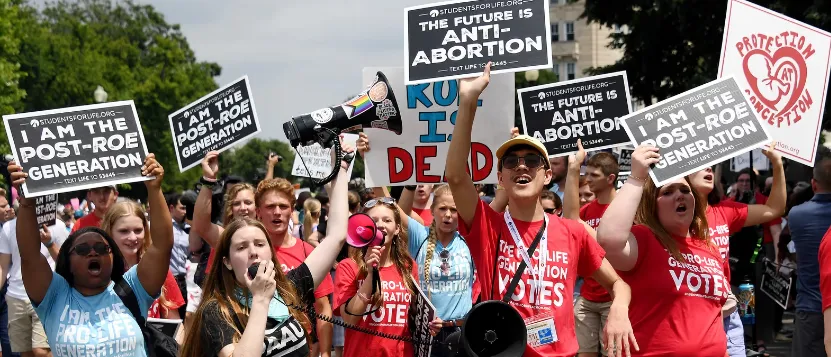The Dark Origins of the Anti-abortion Movement
Al Blenney - 19th December 2022

Until relatively recently Christian protestants had no problems with abortion. The only reference to it in the Christian Bible indicates that an abortion should be attempted if a woman becomes pregnant as a result of adultery (Numbers 5:27) There isn’t much wriggle-room in this verse, so latterly fundagelical Christians would rather pretend it doesn’t exist, because a bunch of money-grubbing racists decided abortion made an excellent stalking horse.
In the 1970s the U.S. Federal government’s policies against racial discrimination were gathering momentum. What galvanised the hard-core southern Christians as a political movement was a proposal by the Internal Revenue Service (IRS) to remove the tax-exempt status of Bob Jones University because of its racially discriminatory policies. Other racially discriminatory education institutions also came under IRS scrutiny.
The Christians needed political power to stave off the IRS. So they cast around for something that could mobilise their base into a political movement. They tried prayer in schools, pornography, the equal rights amendment for women. None of these seemed catchy enough to create a voting bloc.
Abortion was an unlikely last-minute suggestion since it was the province of their old enemies; the Catholics, but it was worth a try.
It took until about the 1980s, with the help of a well-funded and well-crafted propaganda campaign (complete with horror stories and graphic images) with the prominent Televangelist Jerry Falwell as a leader, that the fundagelical masses came on board. Indeed, so successful was the anti-abortion campaign that it swept the English-speaking (and other?) worlds. This was definitely 1984 stuff – apparently the fundagelicals had been anti-abortion since the beginning of time, even though (for example) a well-known conservative theology professor had published an opinion piece in Christianity Today in 1968 explaining the bible says that life begins at birth:
“God does not regard the foetus as a soul, no matter how far gestation has progressed. The Law plainly exacts: ‘If a man kills any human life he will be put to death’ (Lev. 24:17). But according to Exodus 21:22–24, the destruction of the foetus is not a capital offence…Clearly, then, in contrast to the mother, the foetus is not reckoned as a soul.”
The magazine Christian Life agreed “The Bible definitely pinpoints a difference in the value of a foetus and an adult.”– and subscribers thought these were not false positions. Indeed, the ultra-conservative Southern Baptist Convention (which split from the Baptists because the Baptists didn’t like their racism) proposed in 1971 that abortions should be legal, not only to preserve the mother’s life but also her well-being. All of these theological positions were hastily swept under the carpet, and the racist origins of the movement were conveniently obfuscated by a campaign that tugged at peoples’ heartstrings.
This new anti-abortion dogma, along with tacked-on opposition to feminism, homosexuality, sex-ed in schools and contraception, meant that Catholics could join the fold, and so was born the Moral Majority.
The Republicans needed an issue that could counter the recent electoral gains of the Democrats. And so with a guaranteed voting bloc to hand and with a natural aversion to the freedoms of the sexual revolution, the Republicans jumped on the anti-abortion (etc) band-wagon. With consequences that are still playing out today.
The Guardian has a good piece which gives further background on the issue.